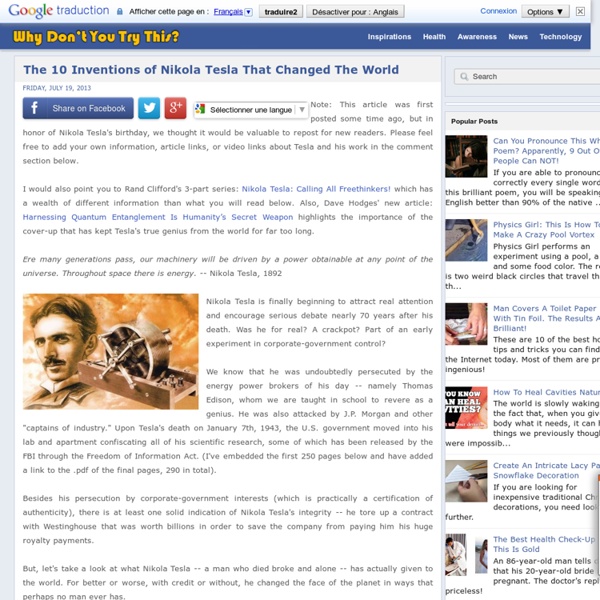Recovered The Ten Inventions of Nikola Tesla Which Changed The W
Nikola Tesla-Did You Know? “Tesla was considered an eccentric man who talked of death rays that could destroy 10,000 airplanes at a distance of 250 miles. However, Tesla devised the AC (alternating current) system that we use in our homes today. AC offered great advantages over the rival DC system. By using Tesla’s transformers, AC voltages could be stepped up (or down) and transmitted over long distances through thin wires. DC could not (it required a large power plant every square mile and had to be transmitted through very thick cables). At the 1893 World Exposition in Chicago, Tesla demonstrated the safety AC electricity was by passing high frequency AC power through his body to power light bulbs. By 1898, he was demonstrating to the world the first remote controlled model boat at Madison Square Garden. Nikola Tesla was born at midnight on July 9, 1856 in Smiljan, Lika, Croatia. “…the idea occurred to me like a flash of lightning and in a second the truth revealed itself. 1. 2. 3.
The Missing Secrets of Nikola Tesla
The Secret Life of Nikola Tesla « Revolutionizing Awareness
Posted by Admin on June 16, 2010 by Nikola Tesla Suppose some one should discover a new mechanical principle–something as fundamental as James Watt’s discovery of the expansive power of steam—by the use of which it became possible to build a motor that would give ten horse power for every pound of the engine’s weight, a motor so simple that the veriest novice in mechanics could construct it and so elemental that it could not possibly get out of repair. Then suppose that this motor could be run forward or backward at will, that it could be used as either an engine or a pump, that it cost almost nothing to build as compared with any other known form of engine, that it utilized a larger percentage of the available power than any existing machine, and, finally, that it would operate with gas, steam, compressed air or water, any one of them, as its driving power. It does not take a mechanical expert to imagine the limitless possibilities of such an engine. Read the rest of this entry »
Nikola Tesla
Nikola Tesla (Serbian Cyrillic: Никола Тесла; 10 July 1856 – 7 January 1943) was a Serbian-American[3][4] inventor, electrical engineer, mechanical engineer, physicist, and futurist who is best known for his contributions to the design of the modern alternating current (AC) electricity supply system.[5] Born and raised in the Austrian Empire, Tesla received an advanced education in engineering and physics in the 1870s and gained practical experience in the early 1880s working in telephony and at Continental Edison in the new electric power industry. He emigrated to the United States in 1884, where he would become a naturalized citizen. He worked for a short time at the Edison Machine Works in New York City before he struck out on his own. With the help of partners to finance and market his ideas, Tesla set up laboratories and companies in New York to develop a range of electrical and mechanical devices. Early years Tesla's baptismal record, 28 June 1856 Working at Edison A move to the US
N. Tesla: The Day Science beginngs to study...
The "General Fundamentals" of the Plymouth Colony (Reason): American Treasures of the Library of Congress
The Book of the General Laws of the Inhabitants of the Jurisdiction of New-Plimouth is one of the oldest items in the Library's collection of American laws. This 1685 book reproduces the contents of a 1671 volume, which was the first edition of the laws to be printed, and adds laws enacted between 1671 and 1684. The Colony of New Plymouth, founded by the Pilgrims who arrived in the Mayflower in December 1620, occupied the southeastern corner of the present state of Massachusetts. It was soon surpassed in population and wealth by the Massachusetts Bay Colony, centered on Boston, and was annexed to Massachusetts in 1691. The Colony of New Plymouth made several major contributions to American legal institutions. The punishment for adultery set out in this code and in the 1694 laws of the Massachusetts Bay Colony, stipulating that adulterers must bear the letters "A" and "D," provide the basis for some of the best known elements in Nathaniel Hawthorne's 1850 novel The Scarlet Letter.
The Plymouth Colony Archive Project, Topical Articles
"A Prosperous Wind" © by artist Mike Haywood Articles on the Colony Articles on Prof. James Deetz Regional Studies of Mortuary Customs in New England Project Home Page • Archive Home Page Excerpts from The Times of Their Lives
The Pilgrims and Plymouth Colony:1620
© Duane A. Cline 2006 Part I. Pilgrim Background THE BIBLE FROM LATIN TO ENGLISH THE STATE CHURCH ---- Link to Map of Scrooby Region SEPARATISTS (PILGRIMS) ---- Link to Principal Leaders of the Scrooby Pilgrims PURITANS FIRST ATTEMPT TO LEAVE ENGLAND ---- Link to First Attempt to Depart, 1607, and Map THE SEPARATISTS DEPART FOR HOLLAND ---- Link to Second Attempt to Depart, 1608, and Map ---- Link to Map of English Homes of the Pilgrims ---- Link to Contemporary Photos of Pilgrims' English homes and churches March 2003 THE LEIDEN SEPARATISTS ---- Link to View of Leiden and the City Map ---- Link to photo of facade of St. Part I. Until the latter part of the sixteenth century, the only Bibles available were printed in Latin. At the time the Pilgrim Fathers were living in England there was only one church approved by the English rulers. There were two major groups of believers who disagreed with the beliefs and practices of the Church of England.



